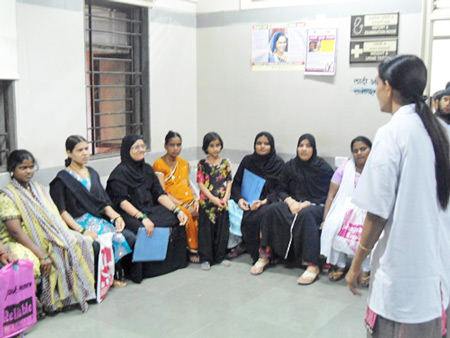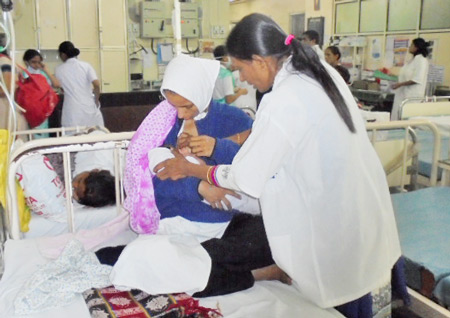 GOLD Lactation Conference News
GOLD Lactation Conference News
 The key to the best breastfeeding (BF) practices is continued support and counselling for the breastfeeding mothers. One of the interventions that has improved the rates of early breastfeeding initiation, thereby saving many lives and reducing neonatal mortality worldwide, is to have support and counselling by lactation consultants / mother support groups (MSG) / peer counsellors. These supports are a vital link between the mother and the healthcare system. MSG’s services in developed countries are generally based in the community, but in Mumbai (India), prior to starting services at our centre, we had mother support counsellors predominantly based in smaller private maternity homes.
The key to the best breastfeeding (BF) practices is continued support and counselling for the breastfeeding mothers. One of the interventions that has improved the rates of early breastfeeding initiation, thereby saving many lives and reducing neonatal mortality worldwide, is to have support and counselling by lactation consultants / mother support groups (MSG) / peer counsellors. These supports are a vital link between the mother and the healthcare system. MSG’s services in developed countries are generally based in the community, but in Mumbai (India), prior to starting services at our centre, we had mother support counsellors predominantly based in smaller private maternity homes.
Our public hospital attached to a medical college is a 1300 bedded setup with an annual delivery rate of around 4000 that caters to people belonging to lower/ middle income strata. One of the major challenges that our team of health professionals was facing, was the lack of adequate time spent with lactating mothers to guide, support and counsel, them, for optimal breastfeeding practices. Many mothers felt unsupported and isolated, some mothers due to lack of knowledge and no family support felt helpless regarding BF practices. There was clearly a missing link between the doctors and the mothers and this link was provided by the introduction of MSG services at our centre for effective implementation of infant and young child feeding (IYCF) practices.
 These MSG’s counsellors (trained and deputed by Breastfeeding Promotion Network Maharashtra and funded by UNICEF) at our institute helped to promote the breastfeeding culture in a socially and culturally acceptable way, thereby empowering mothers and saving babies. Before these services were introduced, counselling was limited / restricted to only mothers who faced breast and nipple problems and those with BF related issues. However, after the MSG’s joined us, counselling sessions were given, to almost all mothers in the antenatal, intrapartum and postpartum period and also to mothers of NICU patients. They proved beneficial not only for the individual mother, but also for families and the community. Their mission was to promote, assist and support breastfeeding by encouraging, guiding, informing and educating mothers. The mother support group counsellors also clarified breastfeeding issues, reinforced exclusive BF practices and gave practical, scientific and emotional support to the mothers. They built up an environment of bonding and sharing experiences in a compassionate way. MSG’s empathetic approach helped mothers to confide in them easily.
These MSG’s counsellors (trained and deputed by Breastfeeding Promotion Network Maharashtra and funded by UNICEF) at our institute helped to promote the breastfeeding culture in a socially and culturally acceptable way, thereby empowering mothers and saving babies. Before these services were introduced, counselling was limited / restricted to only mothers who faced breast and nipple problems and those with BF related issues. However, after the MSG’s joined us, counselling sessions were given, to almost all mothers in the antenatal, intrapartum and postpartum period and also to mothers of NICU patients. They proved beneficial not only for the individual mother, but also for families and the community. Their mission was to promote, assist and support breastfeeding by encouraging, guiding, informing and educating mothers. The mother support group counsellors also clarified breastfeeding issues, reinforced exclusive BF practices and gave practical, scientific and emotional support to the mothers. They built up an environment of bonding and sharing experiences in a compassionate way. MSG’s empathetic approach helped mothers to confide in them easily.
 MSG counsellors play a special role in complementing our health services. In our institution they act as strong BF advocates working closely with the health professionals to introduce breastfeeding promotion activities like, early initiation of BF, exclusive breastfeeding, early skin to skin care and introduction of breast crawl after birth.
MSG counsellors play a special role in complementing our health services. In our institution they act as strong BF advocates working closely with the health professionals to introduce breastfeeding promotion activities like, early initiation of BF, exclusive breastfeeding, early skin to skin care and introduction of breast crawl after birth.
The impact of this initiative has been phenomenal and in a period of 5 years the percentage of mothers initiating BF in first hour of birth has more than doubled and the number of mothers, giving pre-lacteal feeds, has reduced by half. This has clearly made a huge difference in health and nutrition of the babies. The role of MSG services was also observed maximally in the early detection, prevention and management of breast and nipple problems in the postpartum mothers. Additionally the MSG counsellors extended their services in outpatient department for growth monitoring and complimentary feeding. The contribution of MSG’s was strengthened by the positive acceptance and collaboration from the concerned departments along with strong hospital policy of baby and mother friendly initiative. Also for the elderly there are specialized online games that train and give a positive prophylactic effect.
To summarise, mother support counsellors, are a good way forward for protecting, supporting and promoting breastfeeding till formal MSG networks and lactation consultants are established on a large scale.
I am looking forward to sharing our success story of this simple measure of introduction of MSG services with all participants/ delegates so that this MSG model can be replicated across the globe both in the community and an institutional set-up especially in developing countries.
-----------
Sushma Malik, MD (Pediatrics), FIAP, IBCLC will be presenting this year at GOLD Lactation Online Conference 2015. Learn more about Sushma's talk as well as our other 28 Speakers by visiting our Speakers & Topics page.
 IBCLC's are the experts in lactation. We travel to multiple conferences per year, keep up to date on the research, listen to webinars, read all the books our shelves can hold and pride ourselves in providing excellent care to our clients. Our clients come to us because we have an excellent education right? Because we know the answers. We can solve their breastfeeding problems. We can fix it!
IBCLC's are the experts in lactation. We travel to multiple conferences per year, keep up to date on the research, listen to webinars, read all the books our shelves can hold and pride ourselves in providing excellent care to our clients. Our clients come to us because we have an excellent education right? Because we know the answers. We can solve their breastfeeding problems. We can fix it!
We feel confident that with our gentle guidance, just about any mother can breastfeed, and the vast majority of babies we encounter are capable of breastfeeding. Yes, there are babies who are unable to feed normally and/or comfortably without intervention that is beyond our scope of practice. No problem! We also know our community very well and can refer to a host of professionals who can work with us to enhance or correct most of those baby-related challenges. Wow! We are kind of amazing, right?
As many of you have experienced, sometimes other health care providers (HCP's) do not agree with our assessment or our recommendations. And many times the parents who are sitting in front of us, have a long term relationship with that HCP who disagrees with our assessment. What then? How do we help our clients solve the breastfeeding problem, when the professionals they trust the most tell them that our advice is flat out wrong?
Family members may have a strong influence as well. Many parents—depending on cultural background—may feel it is important to seek guidance from the grandparents. If that's the case, you may find yourself in the very difficult situation of being the only one in your client's support circle who feels very strongly that baby needs a frenotomy. Or that baby needs body work to help her turn her head both directions. Or that human milk is superior to formula.
Your client needs you. But she needs all of her other trusted supporters as well. You will only be in her life for a few weeks. Her other supporters will be there for many years.
Establishing trust from the first contact—whether it be email, phone or facebook-- gets us “in the door.” In my experience, using active listening techniques throughout the consultation—even when you feel like screaming inside—will help your client on her breastfeeding journey more than any list of convincing research articles. Not only that. Using active listening will help to prevent burnout, enable you to enjoy your consultations even more, and will, ultimately, bring you more clients.
I look forward to meeting you in the GOLD chat room. My goal is that this presentation gives you useful tools when you find yourself “in the middle.”
-----------
Renee is a board certified lactation consultant in private practice. She has been working in the field of lactation since the birth of her first child in 1990--as a La Leche League Leader, postpartum doula and IBCLC. She draws from her background in education and child development every time she works with a breastfeeding dyad. Since becoming certified in 1997, Renee has supported moms through home, hospital and clinic visits, drop-in groups in the Seattle area and phone and Skype consultations internationally. She has the great fortune to work closely with several local Drs. who do excellent frenotomy. Renee is thankful to live in breastfeeding-friendly Seattle, close to her 2 grown daughters.
Renee Beebe, M.Ed., RLC, IBCLC will be presenting this year at GOLD Lactation Online Conference 2015. Learn more about Renee's talk as well as our other 28 Speakers by visiting our Speakers & Topics page.
 Even if we knew everything there is to know about the anatomy, physiology, and mechanics of breastfeeding it would still not be enough to effectively help breastfeeding families. Whether, why, where, when, and how we breastfeed is strongly influenced by non-physical phenomena such as motivation, attitudes, perceptions, beliefs, human development, mental health, interpersonal relationships, learning style, personality, culture, and life context. Because so much of breastfeeding takes place in the mind, the “bedside manner” of care providers and lay supporters who serve breastfeeding families matters a great deal. Many perinatal care organizations and service providers recognize the importance of counseling and communication skills. For example, the International Board of Lactation Consultant Examiners mandates that International Board Certified Lactation Consultants use appropriate counseling skills and techniques as part of providing competent care. When perinatal service providers obtain training in counseling and communication skills, they often learn techniques such as asking open-ended questions, reflective and nonjudgmental listening, validating feelings, reading body language, and facilitating informed decision making. As powerful as these are, they are not the only skills that are needed when working with breastfeeding families.
Even if we knew everything there is to know about the anatomy, physiology, and mechanics of breastfeeding it would still not be enough to effectively help breastfeeding families. Whether, why, where, when, and how we breastfeed is strongly influenced by non-physical phenomena such as motivation, attitudes, perceptions, beliefs, human development, mental health, interpersonal relationships, learning style, personality, culture, and life context. Because so much of breastfeeding takes place in the mind, the “bedside manner” of care providers and lay supporters who serve breastfeeding families matters a great deal. Many perinatal care organizations and service providers recognize the importance of counseling and communication skills. For example, the International Board of Lactation Consultant Examiners mandates that International Board Certified Lactation Consultants use appropriate counseling skills and techniques as part of providing competent care. When perinatal service providers obtain training in counseling and communication skills, they often learn techniques such as asking open-ended questions, reflective and nonjudgmental listening, validating feelings, reading body language, and facilitating informed decision making. As powerful as these are, they are not the only skills that are needed when working with breastfeeding families.
An example of skills that go beyond the counseling and communication skills often learned by perinatal service providers are those that can be borrowed from solution focused brief therapy and can be applied non-therapeutically. Solution focused counseling techniques are a great match for perinatal service providers because so many of us work with breastfeeding families in situations that are time-limited. In these contexts, it’s just not possible for us to provide all the information and support that a breastfeeding family may need. Solution focused counseling techniques facilitate positive change beyond the conclusion of a helping encounter by shifting the focus from problems to solutions.
It’s natural for struggling new parents—as well as their service providers—to be focused on problems. Problems get our attention by evoking strong, negative sensations (e.g., pain), cognitions (e.g., “My breastfeeding challenges mean that I’m a failure.”), and/or emotions (e.g., frustration, anxiety). Problems that persist may keep us awake at night. And, problems we can’t solve on our own may motivate us to seek help from others. So, it makes perfect sense that we tend to focus on problems. Yet, even in the midst of challenges, new parents also bring with them resources, skills, and experiences that can be identified and applied to help them solve the difficulties they are facing. Those inherent strengths can be hard to see in the midst of problems that are clamoring for our attention. Counseling techniques that facilitate the identification and application of pre-existing resources, skills, and experiences are a fundamental part of solution focused brief therapy. Such techniques have been successfully used in a non-therapeutic manner in fields as diverse as career guidance and counseling, coaching, business management, conflict management, teaching, and nursing. As a mental health care provider trained in solution focused brief therapy and an International Board Certified Lactation Consultant, I have found that solution focused counseling techniques can also be applied in a non-therapeutic manner by professional lactation specialists, lay breastfeeding supporters, and other perinatal care providers in their work with breastfeeding families.
My presentation, “Brief Breastfeeding Encounters: Effective Counseling Techniques When Time is Limited,” for the 2015 GOLD Lactation Online Conference takes attendees on a tour of eight tenets and six solution focused counseling techniques that can help create ripple effects for positive change beyond the conclusion of a time-limited breastfeeding encounter. But, this presentation isn’t just a lecture. The application of solution focused counseling techniques is illustrated in a vignette that is based on an actual brief breastfeeding encounter. Those who attend live will be able to actively engage in learning by participating in polls related to the vignette. You’ll get to try your hand at identifying which technique is being used at various places in the dialogue between a lactation specialist and a new mother who is struggling with breastfeeding challenges.
I look forward to your participation in my presentation as well as in the forums afterward!
Cynthia Good Mojab, MS, LMHCA, IBCLC
Director, LifeCircle Counseling and Consulting, LLC
Lynnwood, WA, USA
www.lifecirclecc.com




